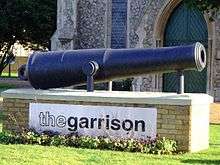MoD Shoeburyness
| MoD Shoeburyness | |
|---|---|
| Shoeburyness, Essex | |
|
Clock tower at Horseshoe Barracks, Shoeburyness | |
 MoD Shoeburyness | |
| Coordinates | 51°32′14″N 0°48′27″E / 51.53710°N 0.80741°E |
| Type | Firing Range |
| Site information | |
| Open to the public | No |
| Site history | |
| Built | 1849 |
| In use | 1849–Present |
MoD Shoeburyness is a military installation at Pig's Bay near Shoeburyness in Essex.
History


In 1849 the Board of Ordnance purchased land at South Shoebury with a view to setting up an artillery testing and practice range. (Until then, Plumstead Common and Woolwich Common had been used, but these were no longer viable due to the increasing power and range of the weapons.) Its use grew significantly during the Crimean War. Around this time the officers' mess was set up in a former Coastguard station on what is now Mess Road, and a series of houses were built alongside, facing the sea, for the commandant and other officers. In 1856 a garrison hospital was established nearby.[1]
RA School of Gunnery
In the wake of the Crimean War the Royal Artillery School of Gunnery was established at Shoeburyness in 1859, with Horseshoe Barracks and various other amenities being added not long afterwards. Over the years that followed Shoeburyness was integral to the development of new and improved artillery weapons.[2] As a result, more space was required for this work to continue, and from 1889 the establishment expanded on to a 'New Range' to the north-east, which encompassed Foulness and Havengore. An accidental explosion in February 1885 killed seven Royal Artillery personnel.[3]
Proof and Experimental Establishment
The Experimental Branch (part of the School of Gunnery since 1859) became an independent operation in 1905 (it was renamed the Experimental Establishment in 1920, and the Proof and Experimental Establishment (P&EE) in 1948, before becoming part of the Defence Test and Evaluation Organisation (DTEO) in 1995).
Shoebury Garrison
In 1920 Shoebury was redesignated as the 'Coast Artillery School' of the Royal Garrison Artillery, following the move of the Field Artillery and Horse Artillery equivalents to a new establishment (the School of Instruction for Royal Horse and Field Artillery) at Larkhill. In 1940 the Coast Artillery School was moved from Shoebury to Llandudno, where it remained for the rest of the Second World War, before relocating to Plymouth.
After the war, artillery and other regiments continued to be garrisoned at Shoebury until 1976 when the garrison headquarters closed. At the same time, the number of military personnel on the staff of the P&EE was reduced, especially in the 1980s, as civilian contractors increasingly took over the running of the Establishment.
Following the closure of the Old Ranges in 1998 the old garrison land and buildings were sold and converted for housing.[2] The New Ranges remain in use, however; the work of the Experimental Establishment, begun in 1859, continues today under the auspices of Qinetiq. The site is known as MoD Shoeburyness.[2]
Present-day use
Active military site
Qinetiq manages the site on behalf of the Ministry of Defence and "provides defence Test and Evaluation (T & E), and training support services which help ensure the safety and effectiveness of munitions and skills used by the UK Armed Services".[4] In particular the site provides a closed and controlled environment for testing weapons systems at various stages of development, for safe disposal of expired ammunition and for live-ammunition training in Explosive Ordnance Disposal techniques.
Former military site
Several buildings and structures on the site are listed; together they are described by Historic England as constituting "a complete mid-19th century barracks".[5] As of 2016 many of these have been refurbished for sale as private houses, and additional housing is being built in the vicinity.
A tower was planned to stand in the Shoeburyness Garrison housing development. The tower was to be 18 storeys high and designed to mark the start of the Thames Gateway development.[6]
Gallery
 Accommodation range (1898) linked to Officers' Mess (1852),Mess Road
Accommodation range (1898) linked to Officers' Mess (1852),Mess Road Gunnery drill shed, Chapel Road (1859)
Gunnery drill shed, Chapel Road (1859) Garrison Church of St Peter and St Paul (1866)
Garrison Church of St Peter and St Paul (1866) Married officers' quarters, The Terracee (1866-71)
Married officers' quarters, The Terracee (1866-71) Sergeants' accommodation, Hospital Road (1861)
Sergeants' accommodation, Hospital Road (1861)_-_geograph.org.uk_-_317239.jpg) Light Quick Firing Battery (1872)
Light Quick Firing Battery (1872)_-_geograph.org.uk_-_317535.jpg) Heavy Quick Firing Battery (1898)
Heavy Quick Firing Battery (1898)
References
- ↑ "A History of Shoebury Garrison". Southend Council. Retrieved 12 March 2016.
- 1 2 3 "MOD Shoeburyness". Qinetiq. Retrieved 12 March 2016.
- ↑ Glennie, p. 24-25
- ↑ "Our work at MOD Shoeburyness". QinetiQ. Retrieved 2 August 2016.
- ↑ "Blocks K-M, Shoebury Garrison". Historic England. Retrieved 2 August 2016.
- ↑ "Thames Gateway – A new landmark for Shoebury?". BBC. Retrieved 12 March 2016.
Sources
- Glennie, D (1948). Gunners' Town. Civic Publications.
